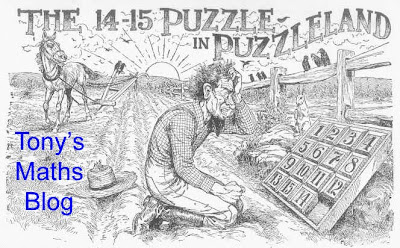Today I had the privilege of taking part in an excellent "Mathematics in Action" day at which around 700 school students heard a series of talks about maths. I was talking about one of my favourite subjects, the Prisoners' Dilemma (PD) (I gave a rather different talk about the same material at Gresham College a few years ago.) I was in amazing company: the other speakers were David Acheson, James Grime and Hannah Fry, and we were wonderfully compered by Sarah Wiseman. It was a delight to talk to such an enthusiastic audience.
This was my second such event, and this time I had enough confidence to ask the audience (by show of hands) how they would play the games I was discussing. I had hoped to win more than my fair share of the "Rock, Paper and Scissors" games, but the audience out-thought me (it probably didn't help my cause that, thanks to a clicker malfunction, my choice was revealed to the audience earlier than I had intended).
But the really interesting thing was when I asked whether the audience would co-operate or defect in the Prisoners' Dilemma. To my surprise, the vast majority of the audience chose to co-operate: to my even greater surprise, those who defected were loudly hissed by many in the audience! This made a point that I was coming to (very briefly) at the end of my talk: games like the PD give us insights not just into games but into issues like trust and reputation. If defecting in a PD results in this kind of opprobrium, then the benefit of a shorter prison sentence may be negated by the damage to one's reputation, and this kind of peer pressure makes co-operation a more profitable choice than defection.
But then when I asked the audience about the "Cold War arms race" PD - should a superpower invest its resources in more and bigger nuclear weapons rather than in health research and education? - the response was different. People who would co-operate in the standard PD, rather than betray their friend, chose to build up their nuclear arsenals. Furthermore, there was no hissing. (To be fair, the way I asked the questions may have had a lot to do with the answers, so I am not claiming that the audience behaviour proves anything at all, only that it is suggestive.)
So basically it appears that we frown upon people who are selfish in their dealings with individuals, but when it is selfishness at national level, our response is quite different. If this reading is correct, then there ia a real challenge to achieving co-operation between nations because we perceive that kind of co-operation as fundamentally different from people interacting as individuals, and we don't feel the same social behaviour to be nice to other nations as we do when we interact with people.
As Martin Nowak says in his fascinating book Super Co-operators, "… Our analysis of how to solve the [Prisoners'] Dilemma will never be completed. This Dilemma has no end."

No comments:
Post a Comment